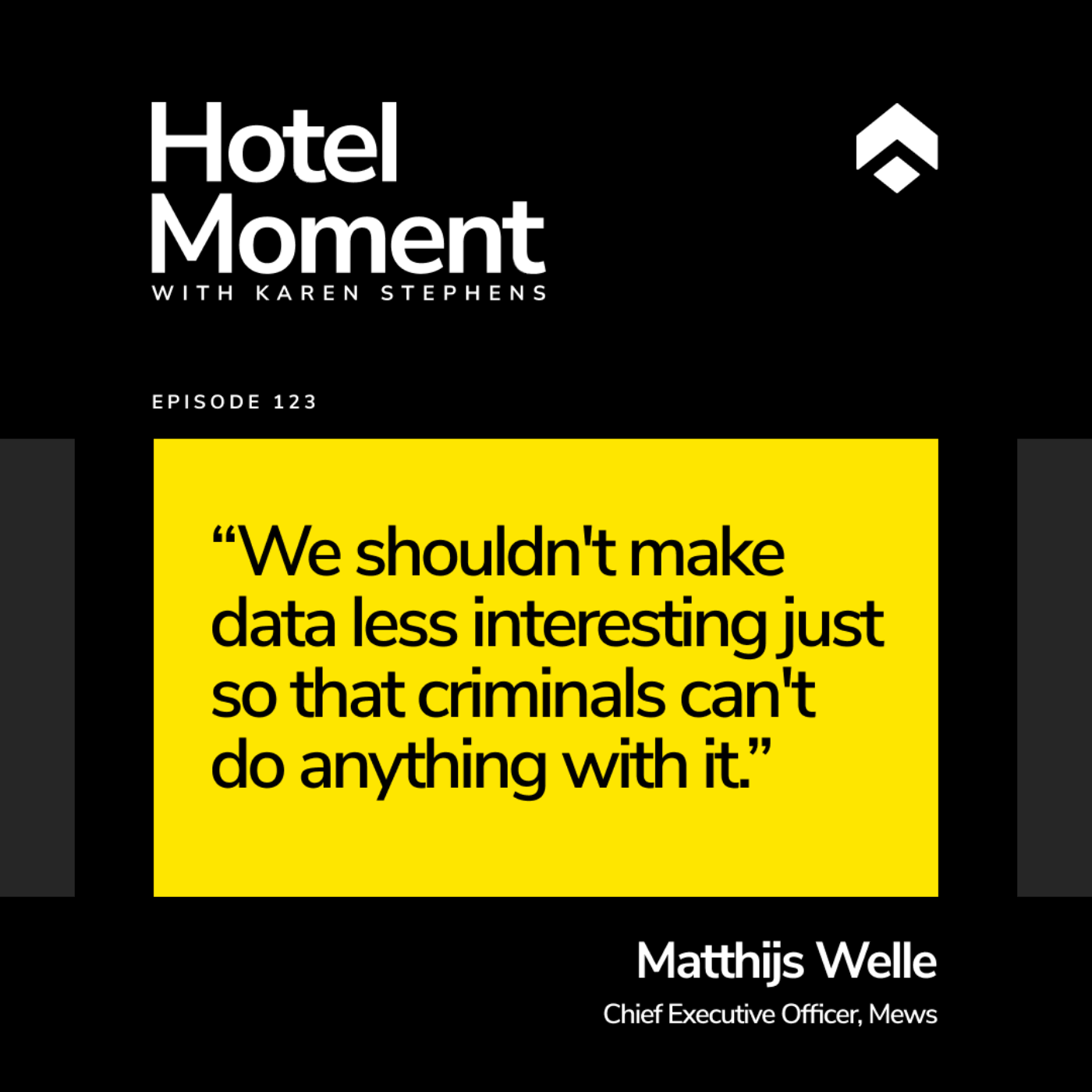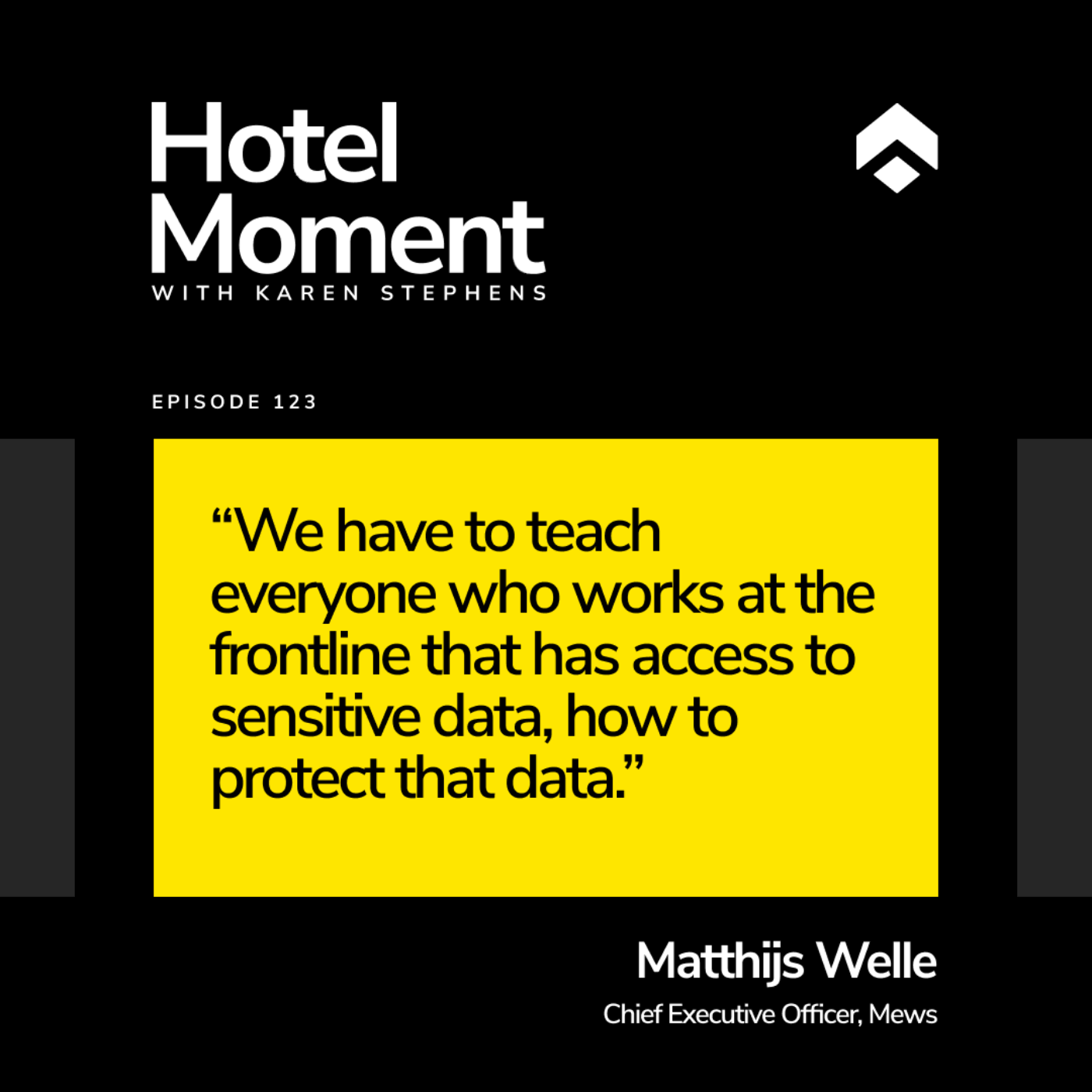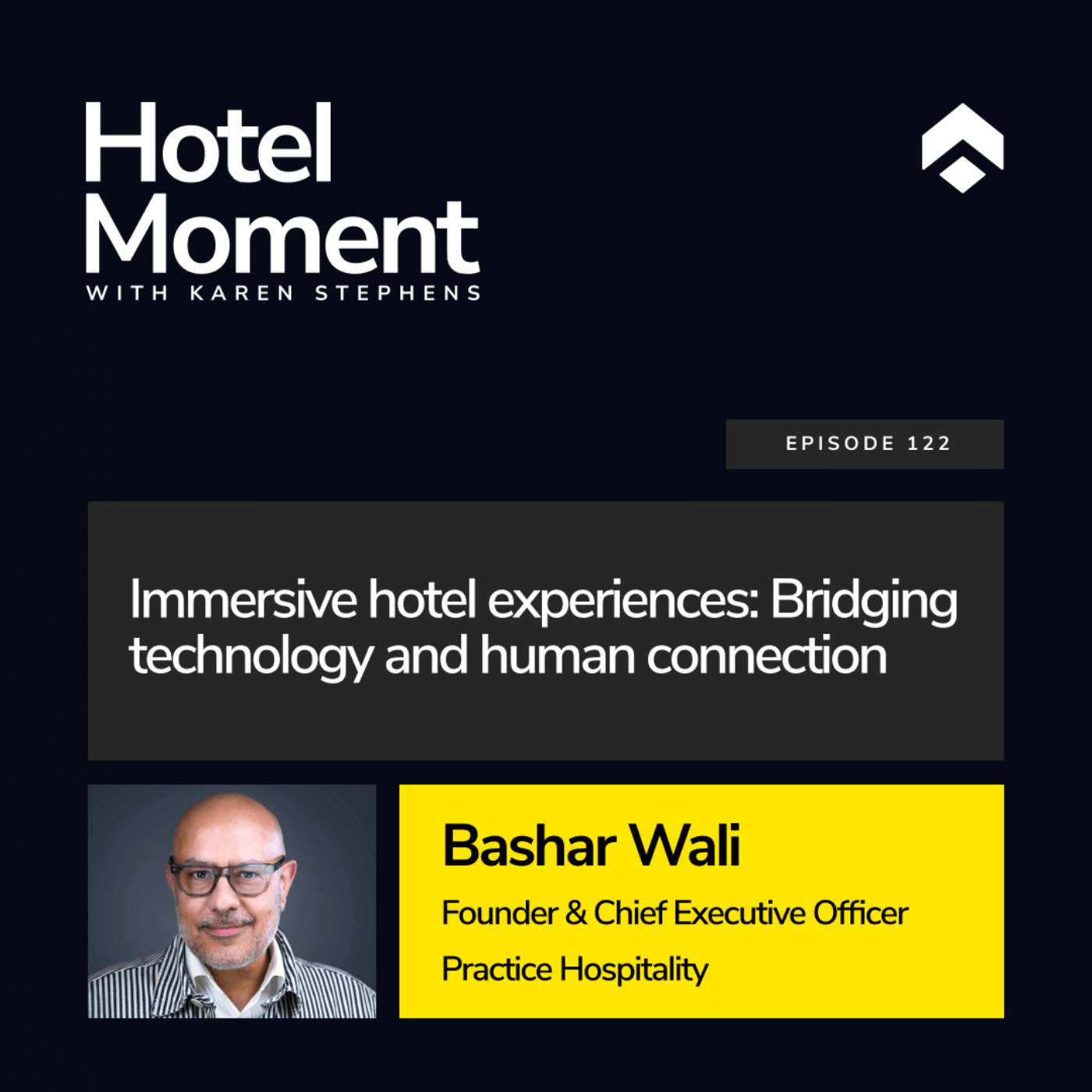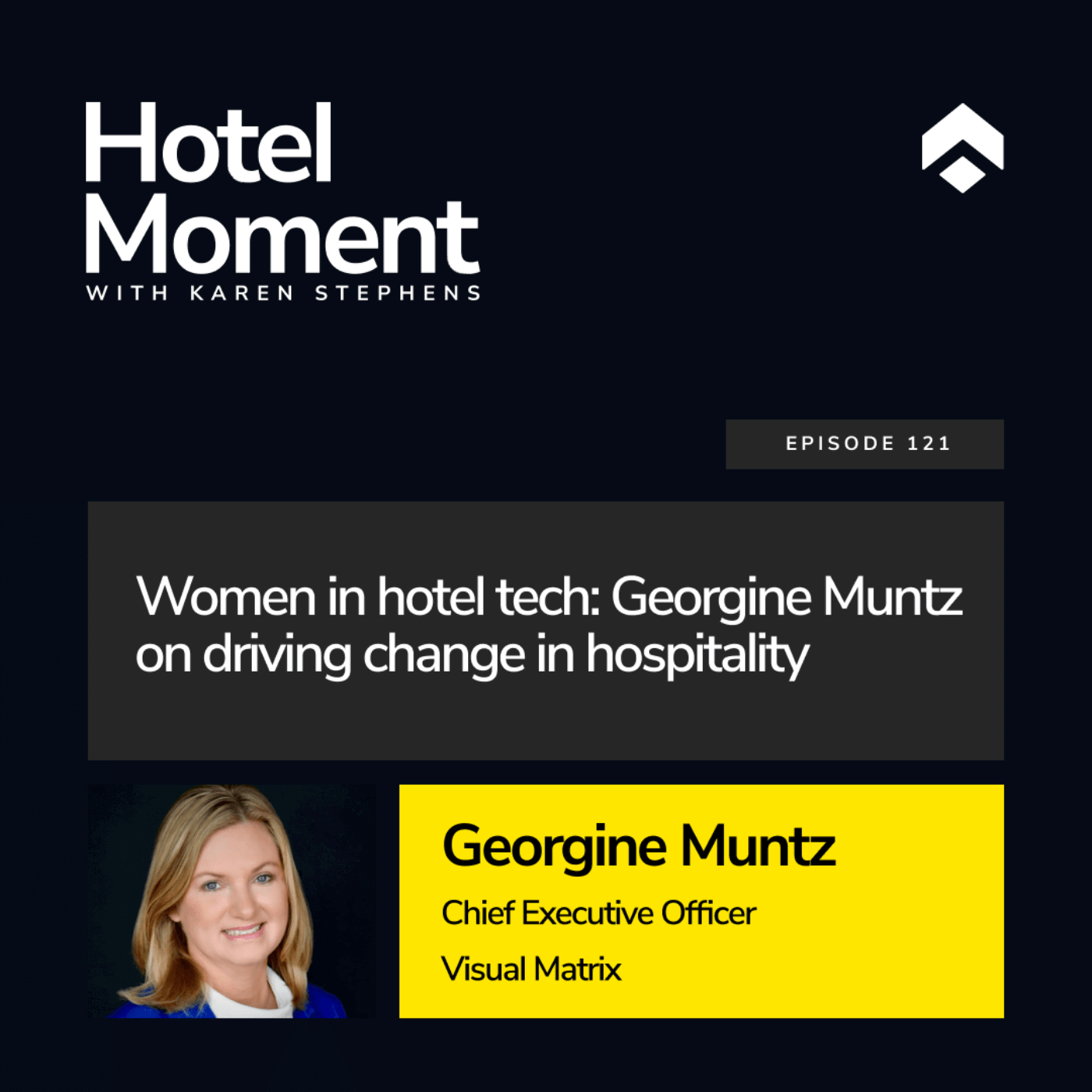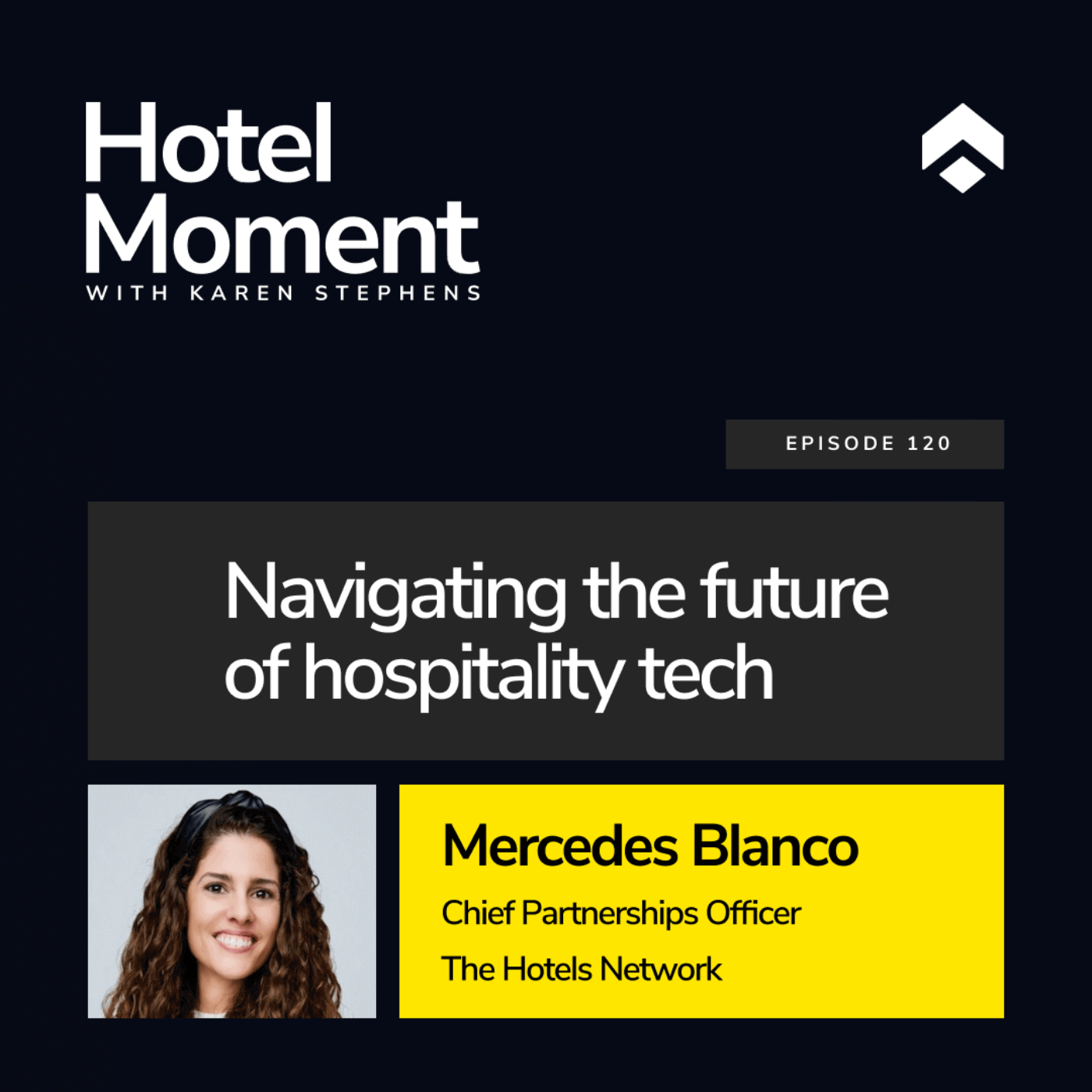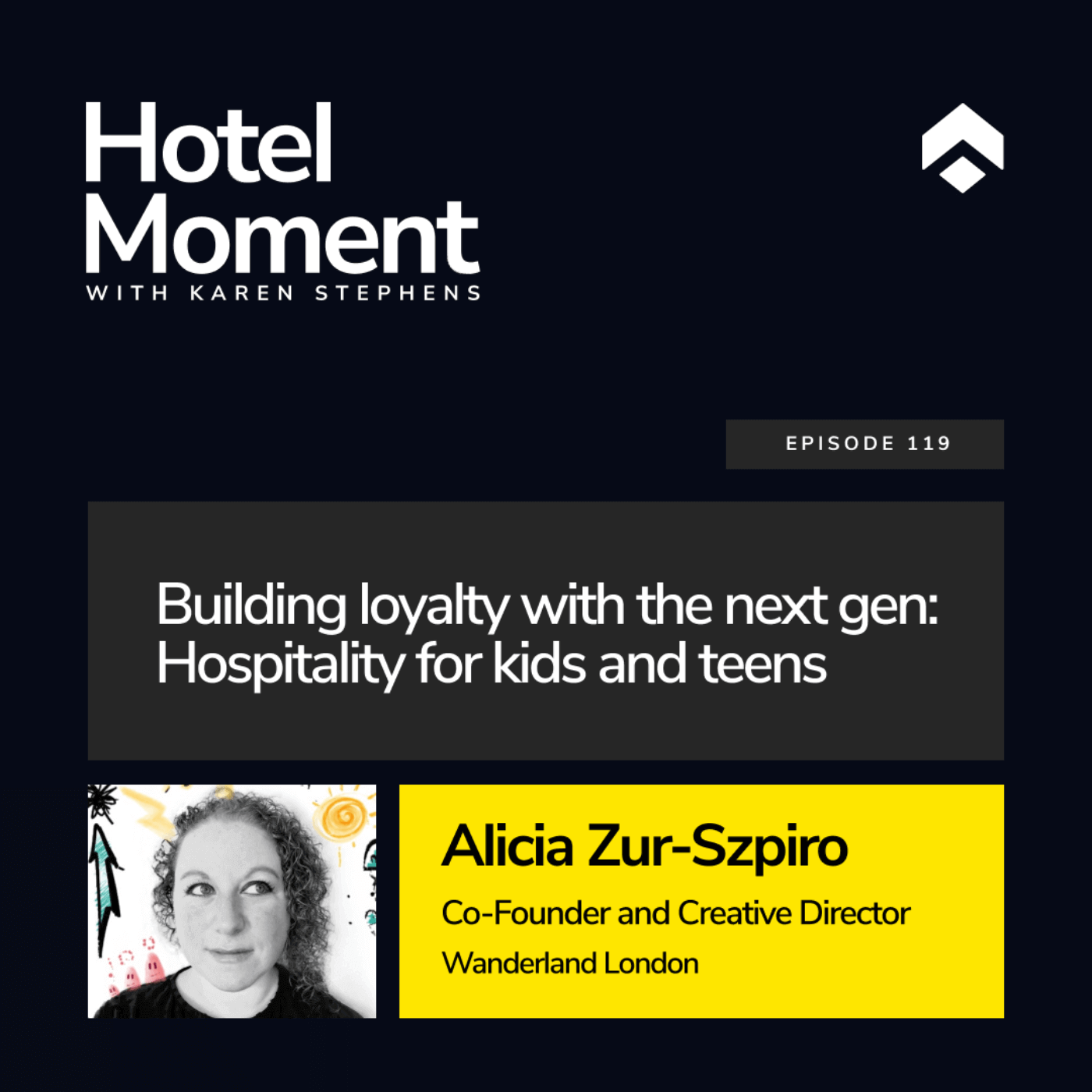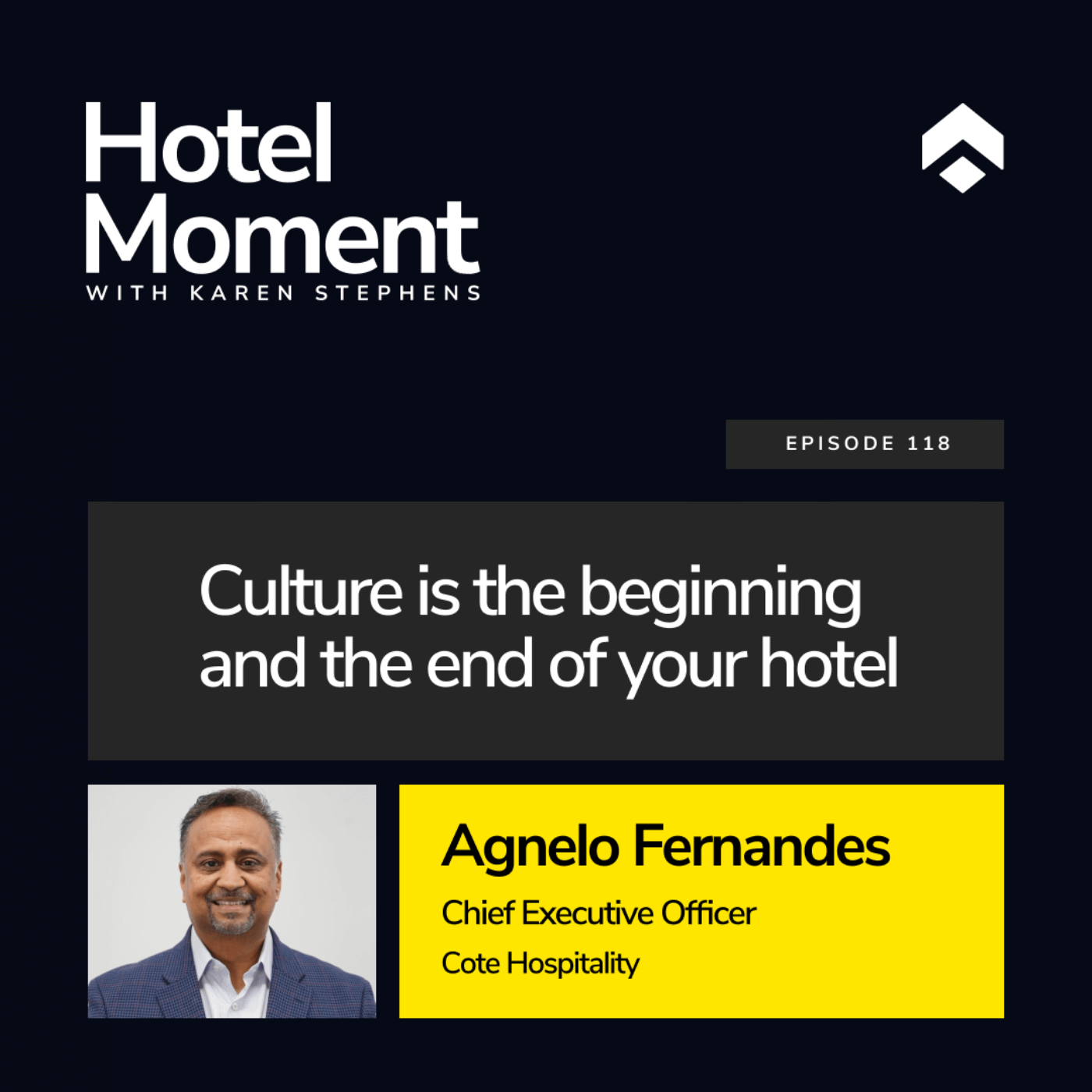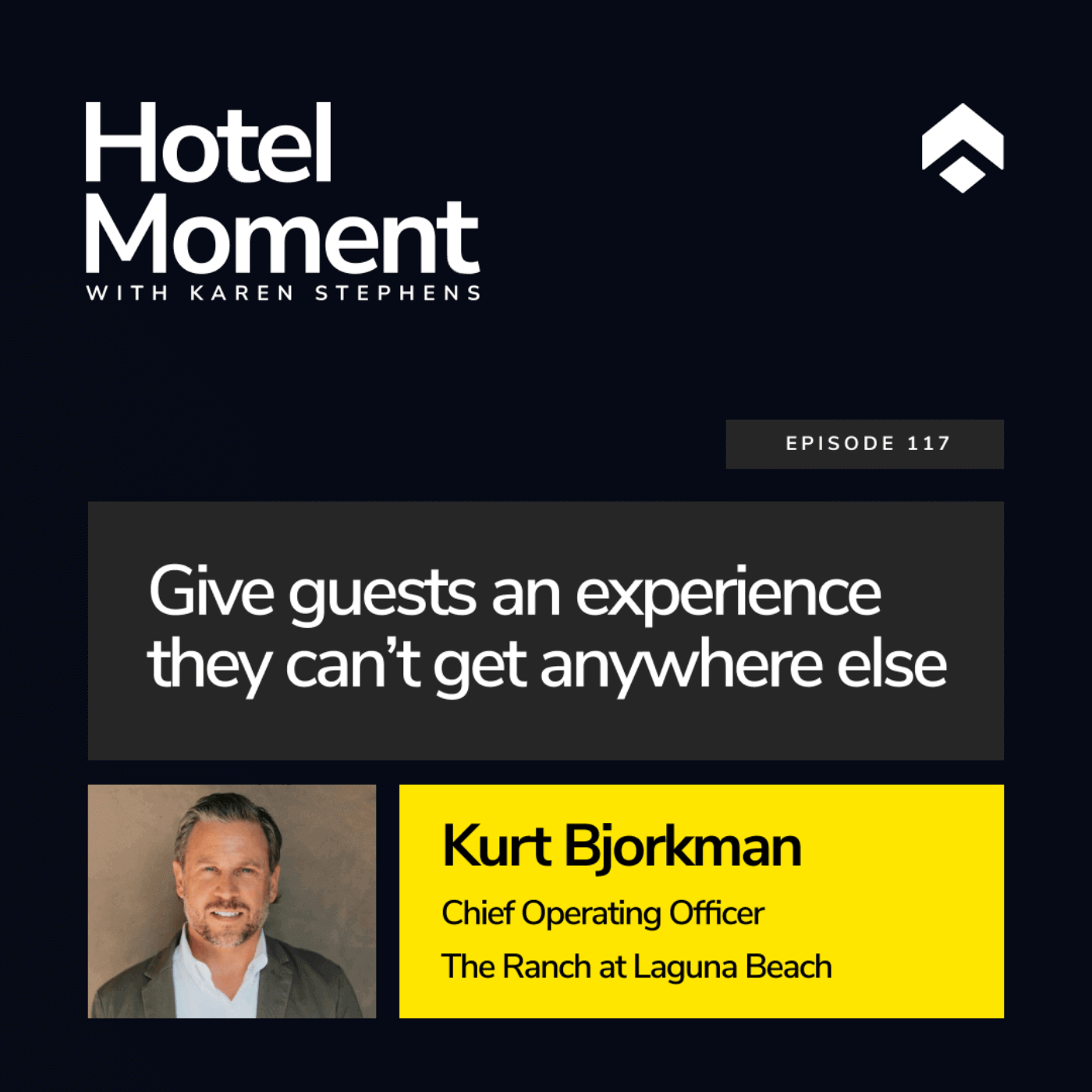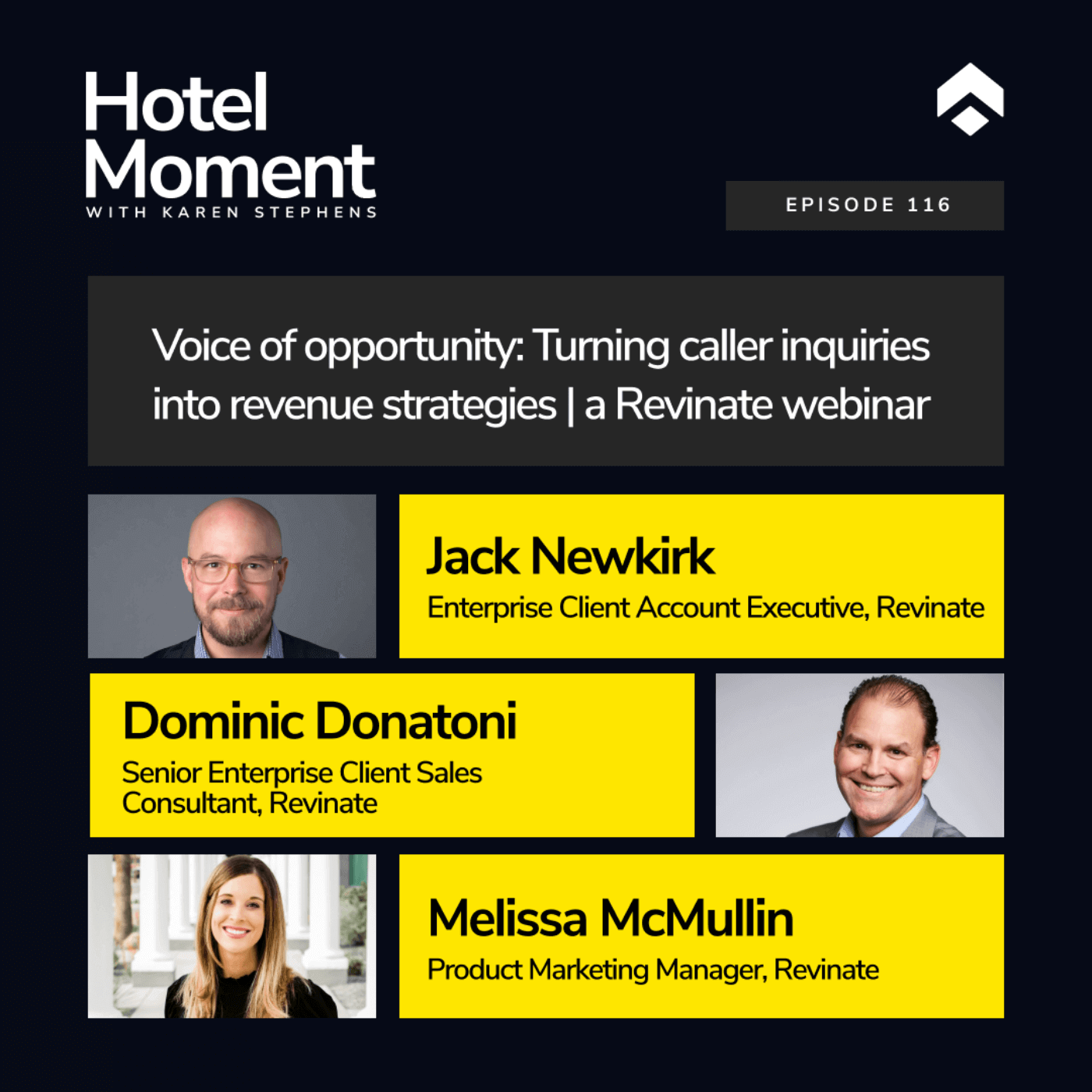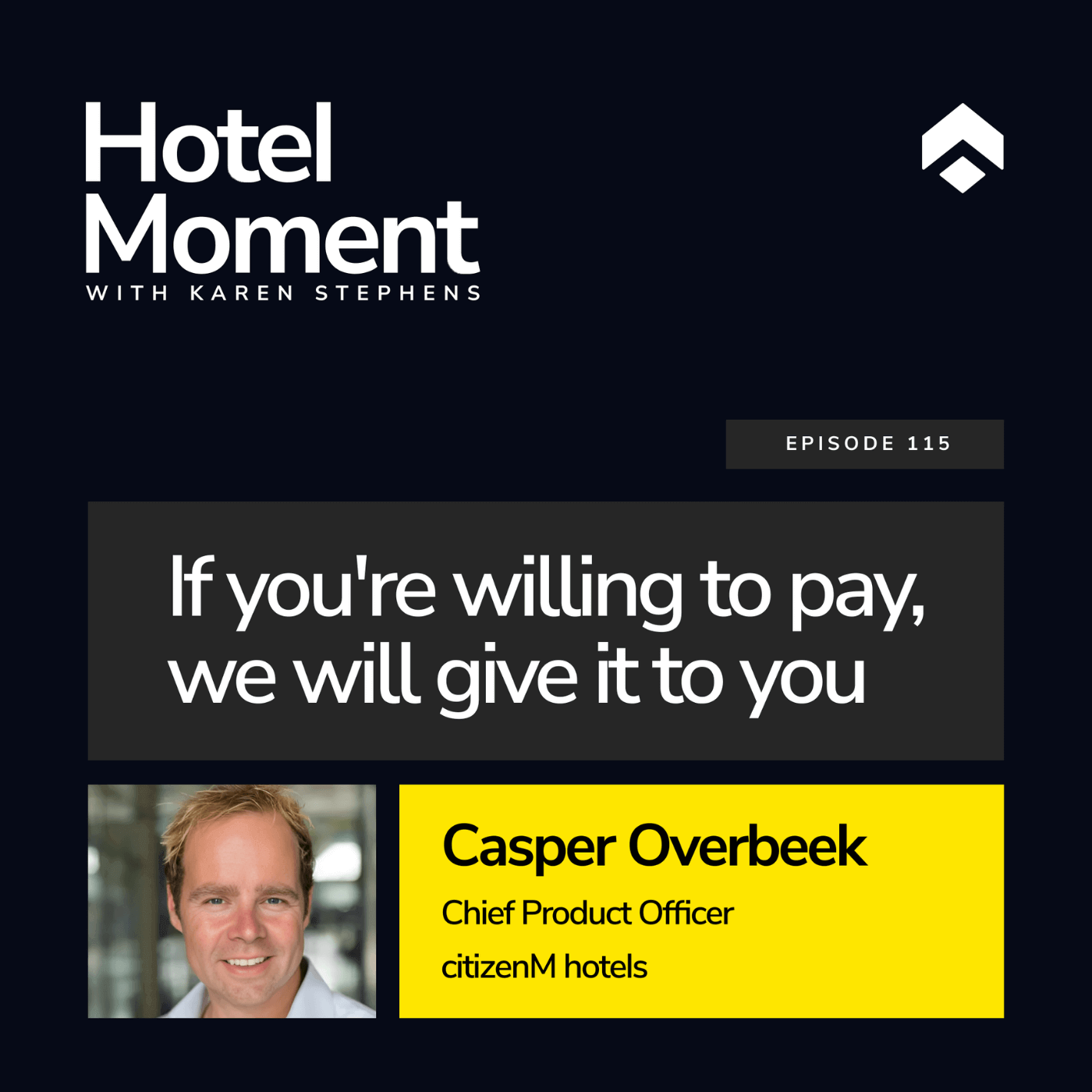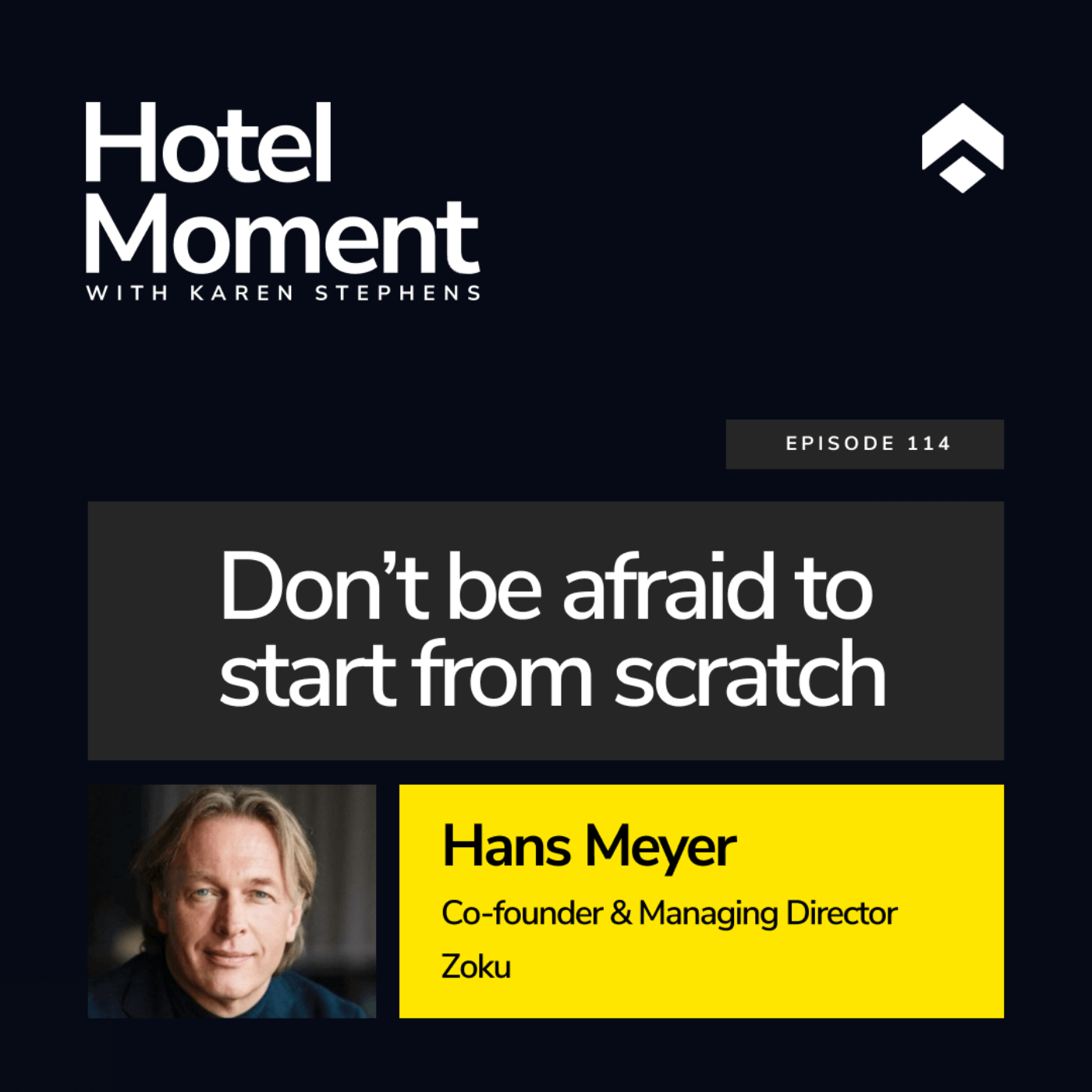Hotel Moment
WITH KAREN STEPHENS


Episode 123
How technology is transforming hotel data security
In this week’s episode of Hotel Moment, Matthijs Welle, CEO of Mews, joins Revinate CEO and guest host Bryson Koehler to shine a light on the one thing hoteliers can’t afford to ignore: hotel data security.
With bad actors attempting to access sensitive hotel and guest data from all fronts, it’s up to hoteliers to not only recognize those threats, but also educate their staff on the warning signs that signal vulnerable guest data.
Matt explains why protecting guest data is the most important responsibility for every hotelier, and why that responsibility becomes much easier by prioritizing clean guest data and limiting data access to relevant hotel departments.
Tune in and find out how to make smart tech investments that take a progressive approach to hotel data security, while facilitating guest communication in a safe and personalized manner.
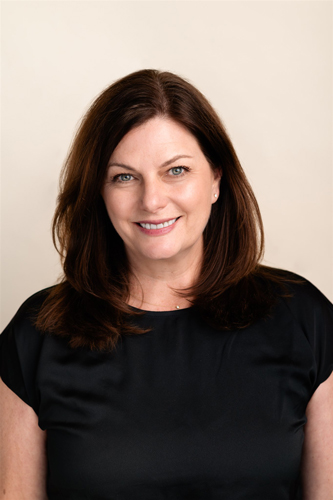
Meet your host
As Chief Marketing Officer at Revinate, Karen Stephens is focused on driving long-term growth by building Revinate’s brand equity, product marketing, and customer acquisition strategies. Her deep connections with hospitality industry leaders play a key role in crafting strategic partnerships.
Karen is also the host of The Hotel Moment Podcast, where she interviews top players in the hospitality industry. Karen has been with Revinate for over 11 years, leading Revinate’s global GTM teams. Her most recent transition was from Chief Revenue Officer, where she led the team in their highest booking quarter to date in Q4 2023.
Karen has more than 25 years of expertise in global hospitality technology and online distribution — including managing global accounts in travel and hospitality organizations such as Travelocity and lastminute.com
Watch the video
Transcript
Matthijs Welle – 00:00:00: We have to teach everyone who works at the frontline that has access to sensitive data how to protect that data. And you can’t look at an IT department to do 100% protection. Yes, there are things you can put in place like Single Sign-On, like two-factor authentication, which make the gaps smaller. But it’s never 100% unless you really make your teams aware of it.
Intro – 00:00:26: Welcome to the Hotel Moment Podcast presented by Revinate. The podcast where we discuss how hotel technology shapes every moment of the hotelier’s experience. This podcast is hosted by Bryson Khoeler, Chief Marketing Officer of Revinate, and she is joined by leaders in the hospitality industry. Tune in as we explore the cutting-edge technology transforming the hospitality industry and hear from experts and visionaries shaping the future of guest experiences. Whether you’re a hotelier or a tech enthusiast, you’re in the right place. Let’s dive in and discover how we can elevate the art of hospitality together.
Bryson Koehler- 00:01:04: Okay, well, good day, everybody. I’m Bryson Koehler. I’m the CEO of Revinate, and welcome back to the Hotel Moment. I am filling in for Karen today, and I have got the amazing pleasure of having Matt from Mews with me. Matt is the CEO of Mews, a longtime hospitality guy who has been in the industry for a long time. And, you know, Matt, welcome, and thanks for being with us today.
Matthijs Welle – 00:01:29: Thank you for having me. You make me sound so old.
Bryson Koehler- 00:01:32: Well, you know, it’s really about experience, right? I’ve been in the industry for a long time, too. So, you know, look, I think one thing would be great to hear from you is, like, how have you kind of seen the hospitality software landscape evolve since you first got engaged in the industry? And what’s really exciting you today about the future of the hotel technology landscape?
Matthijs Welle – 00:01:58: Yeah, so I came into hotels 20 years ago, and I did that on DOS systems, the blue screens, which back then we had iPhones. It’s just that hotels had decided not to use that level of technology. And we just were like holding on for dear life to these DOS systems, these old legacy systems. And I remember the first time I saw one of them and they’re like, “No, you don’t use your mouse in these systems. You do everything with shortcut keys and we’re going to have to train you for a week in a back office room.” And I thought that was just absolutely insane.
Bryson Koehler- 00:02:28: Long live the green screen.
Matthijs Welle – 00:02:30: Yeah, it’s like I did love it. It was a great, great system, but it didn’t allow you to do anything cool. It allowed you to run the business. And you see today that there’s this landscape and we’ve just returned from a big trade show. And you see that the hole that normally hosted the big brands of Marriott and Hilton and Intercontinental suddenly became a tech hole. Because technology becomes almost more important. Nowadays, and what you’re doing with the tech stack, then what brand you have on the roof. And I think that’s the thing that excites me, that you can genuinely build a tech stack that is truly unique to your hotel, to your customers. And that’s really what we tried to start 12 years ago with Mews and opening up that marketplace. And it’s just nice to see that that’s happening now.
Bryson Koehler- 00:03:15: I think that’s really well said. I think if I go back in my hospitality, you know, time machine, yeah, I mean, if you go back 20 years ago, you really needed the power of those big brands and the technology investments that they could make, you know, at global scale to give you the power that you needed to, you know, understand guests and loyalty and bookings and rate management and all of that. But if you fast forward to today. You really can go through that hall and put together an amazing technology stack.
Matthijs Welle – 00:03:51: If you think about the brands, even still today, they pretty much dictate a core tech stack. And hoteliers don’t want that. They are looking for freedom so that they can do the thing that they want to do. And that’s where a lot of the more innovative hoteliers that have a big brand on the roof are considering whether they should strip that brand because they want the freedom and go for more of a soft brand potentially so they’d still get access to the systems. But it is encouraging to see that technology is so critical to entrepreneurs that they will rethink even the brand on the roof.
Bryson Koehler- 00:04:25: I think that’s, yeah, absolutely. In fact, I continue to go around as I’m talking to folks, and I place little $1 bets as to whether or not five years from now we think the, you know, penetration of brands overall, you know, is up, down or flat, you know, from where it is today. And I, you know, I continue to, you know, think that, you know, the power of those brands and the cost, and overhead of those brands is going to continue to be more and more difficult to sell to an asset owner. And the great things that, you know, Mews or Revinate or others are doing to give hoteliers a real opportunity to have the power of modern technology, you know, that really can help them outperform, drive direct bookings, drive better hotel performance, and frankly, have a better net operating income story than they would have otherwise. It’s going to be an exciting few years, I think.
Matthijs Welle – 00:05:26: I really think so. And I get excited because obviously as an industry, we talk a lot about how do I drive more revenue this year versus last year. And it’s hard, like it’s really hard, and you can’t just increase your price every single year because people won’t take it. So you got to get really creative. And that means doing maybe something, getting more return customers or driving up sales or driving cross sales or diversifying your offering with what you have. And that’s the thing that we’re not used to. We’re just used to just increasing the price and then hoping that people will buy it. And something is shifting.
Bryson Koehler- 00:05:58: Yeah. And I think that, you know, we’ve always had headwinds in the hospitality space, right? Whether it’s, you know, terrorism, you know, bird flu, SARS, housing downturns, economic crises, but they were short-lived. Right? We always return to the mean. The industry always returned to the mean. We always got back to the mean. And I think kind of what’s been going on in the last, you know, 12, 16, 18, 24 months is a more long-term permanent structural shift. Structural shift in the cost of capital. Structural shift in the cost of labor, energy, insurance, food, whatever. These are real. These are permanent shifts. You know, we’re not the cost of capital is not going to return to the mean anytime soon. The cost of labor is certainly not returning to the mean anytime soon, right? So these things were, I think, in the past, we could just kind of just wait and see, wait it out and things will get back to normal soon. I don’t think that that’s going to happen this time. And I think the owners and management teams know that and now realize, wait a minute, technology is our friend. We’ve really got to make these technology investments and we have to be smart about how we stitch them together to win in the current environment.
Matthijs Welle – 00:07:23: Totally agree.
Bryson Koehler- 00:07:24: And, you know, other things, you know, you talked about the green screen. You know, the challenges that, you know, the green screen had in terms of usability and onboarding new people, and the training before you got really proficient. One of the benefits of that was, you know, in a more kind of point-to-point solution where it was harder for, you know, teams to fully be able to interact. We certainly didn’t have people phishing user accounts on green screens back in the day.
Matthijs Welle – 00:08:01: Well, they would hack the database, right? They’d try to get into your back office database and steal the whole thing. And because that’s become so much harder, the criminals have changed and morphed into a new kind of type of crime.
Bryson Koehler- 00:08:15: Yeah, I think it’s become so sophisticated today. The level of sophistication, I mean, these crime organizations, whether they’re state-sponsored or they’re kind of e-crime for-profit businesses, or they’re just hacktivists that are doing it for fun. I mean, these are very sophisticated, well-funded. They’re running businesses. They’ve got P&Ls. They set budgets and targets. I mean, they’re really running businesses today.
Matthijs Welle – 00:08:46: Yeah. Like, it’s really smart. Like, you know, if you remember a couple of years ago, you’d get an email saying, “Hey, come click on this link.” That is not what’s happening anymore. It’s got so much more sophisticated. They are, you know, AdWords kings. They are bidding on your AdWords on Google, servicing your login pages, tricking your employees in hotels to hand over your logins, thinking that they’re on our login pages. These criminals are incredible. And the moment they get the logins, they get access to sensitive guest data. And then they start contacting guests. Like, I’ve seen these WhatsApp messages going out to guests saying, “Hey, Mr. Jones, you’ve got a reservation. It’s on the 5th in our hotel XYZ. Unfortunately, your credit card failed. Could you pass us your credit card details?” It’s really, really good. And, you know, you get something that has your name in it. It has the hotel. It has your reservation. You’re like, yeah, this is probably the hotel. And we just have to fight this harder than ever.
Bryson Koehler- 00:09:47: We absolutely do. And, you know, I think the behavior shift is users that we have to go through. You know, we, I think for a long time, trained everybody that if you had antivirus on your machine, you were good.
Matthijs Welle – 00:09:59: Yeah.
Bryson Koehler- 00:09:59: But one fascinating stat that I saw was that in 2024, last year, 79% of kind of hacker attacks were malware free. They were not software exploits. So, you know, only 21% of the attacks were things that, you know, people were downloading software that a traditional kind of antivirus would have picked up. You know, 79% were more what you’re talking about. It’s the social engineering side of this, which is much harder to detect if you’re not a trained user yourself as an expert to detect these things. It’s almost a new skill set. That you gotta put on your resume, which is I’m a fishing detection expert, right?
Matthijs Welle – 00:10:47: Yeah. And there’s nothing, you know, ultimately it’s education. We have to teach everyone who works at the frontline that has access to sensitive data how to protect that data. And you can’t look at an IT department to do 100% protection. Yes, there are things you can put in place like Single Sign-On, like two-factor authentication, which make the gap smaller, but it’s never 100% unless you really make your teams aware of it. And it’s a really long-term game that we’re playing. But it’s the same game that these criminals are playing. This is not a once-and-done attack. This will be life as it is from this moment forward. So we just have to do more to educate.
Bryson Koehler- 00:11:30: I saw also that when we think about like this is life moving forward, and that will continue to evolve. So phishing, which is, you know, using voice to call Matt and impersonate somebody, you know, to, you know, scam you. Those attacks were just between the first half of 2024, and the second half of 2024. So just last year, we’re up 442 percent. So they’re using AI now to, you know, really just continue to leapfrog. And so how do you think about, you know, how do we keep our users ahead of the curve? You know, the pace of technology being deployed in these malicious ways, is accelerating, almost, it seems faster than we’re able to keep up with educating our user community on how to spot them.
Matthijs Welle – 00:12:29: Yeah, so we have whole tech teams now that just full-time think about this, whereas previously you’d build a feature like two-factor authentication, and you’re like, great, we’re good for a few years. Now they built that, and they’re already thinking about what’s the next thing. And we built two-factor authentication, and we enforced it. And, for example, when you have an authenticator app on your phone, that’s not even safe anymore. So we moved to Magic Links, and we’re moving to using biometrics to log in. And we’re always thinking, okay, there’s a whole roadmap of security measures that we’re seeing. And every time we see a different vector with which the criminal is trying to access the system, we’re like, right, that needs to go in parity on my roadmap again. So tech companies need to have full-time teams that think about this deeply, which feels like such a waste of money if you think about it. Like they’re not innovating, they’re not doing things that make the system better. But ultimately, protecting the data is more important than anything else in the world.
Bryson Koehler- 00:13:25: Yeah, I think we’ve just since probably the kind of Q4 timeframe of last year have deployed over 70 product enhancements just related to security that are in many ways not perceptible to our users. They’re not things that make the application better or make you…
Matthijs Welle – 00:13:47: It makes it even worse, right, if you think about it. Now you have to log in with two-factor authentication. And if you’re at a reception desk, and you constantly log in, you’re like, “Oh, this is really annoying.” So, you are almost — users are like, “Oh, this is awful.” But we’re just trying to protect your guests and your users.
Bryson Koehler- 00:14:06: Your brand, your hotel, right? Yeah, I think as we roll out Passkeys, and obviously all of the stuff that Mews is doing, Revinate’s doing, we’ve got hundreds of additional things that we know that we will work on this year. To your point, it’s full squads of engineers, you know, now working on this. I guess we just think that these things are kind of inevitable. What are some of the common mistakes that you see hoteliers make when it comes to managing guest data? And how much of that do you think technology can help? Like all this work that we’re doing and how much of it, you know, is going to come back to we’ve got to really make sure that we step up our game on staff training and education.
Matthijs Welle – 00:14:55: Like the safest place to put guest data is definitely into a cloud system. You know, even though it is possible for someone to compromise the access data, nothing is safer than these cloud systems that are super well protected. But it’s also thinking about does everyone need access to all of this data, and really going through the user rights and making sure that only people that need it, like people in housekeeping, for example, who are on the floor, do they really need to know all of the guest data as well, and shielding that off in the right way and really bucketing what people have access to. And then saying, “Okay, are we ready for Single Sign-On?” Because Single Sign-On is probably one of the best ways to protect your company. But it’s a massive investment into your infrastructure, and making sure that you’re really looking at every user. Are they set up for two-factor authentication or Single Sign-On, and have an IT department that is responsible for one, the system set up, but two, the education saying — “Don’t ever Google logins to access pages because that is where criminals are active.” And Google sometimes helps us, but sometimes they don’t. And when we see an ad that looks that,, that is malicious. So what they do is they promote an ad from a malicious company. That’s an ad company somewhere in Kazakhstan or in Russia that are bidding AdWords. And Google’s like, yeah, that’s a valid advertiser. I’m like, yeah, they probably pay you. So they’re a valid advertiser to you. But to us, that’s a criminal organization that’s trying to capture credentials to our system. And it’s a really difficult conversation. So the best thing we can do is educate our team saying bookmark links to login pages on the computers, because if it’s bookmarked, you’re not going out and Googling using email access. Like Magic Links is safer than authenticator apps. And it’s it’s just this. And this is morphing. And this means that someone in the hotel needs to be your champion. Someone who’s passionate about this, who talks to the hotel employees regularly, that talks about security and educates the team members is a real critical skill that people need to have.
Bryson Koehler- 00:16:59: It absolutely is. I mean, we’ve had to register hundreds of domain names that were, you know, attempting to be used by the bad guys that were, you know, Revinate with two E’s and Revinate.info, Revinate.cc, all of these variations that are slight misspellings, you know, to be able to then, you know, put those into those AdWords campaigns. It’s all there when somebody’s very busy. They’ve got a long line of, you know, guests in front of them. They’re just clicking and trying to, you know, do their job efficiently. It’s so easy to just click on the wrong thing. And we’ve got to continue to find ways to, you know, make it more visible and block that. And yeah, it’s frustrating when you see Google. You know, not being more active. At taking down some of this maliciousness.
Matthijs Welle – 00:17:54: Yeah, and we’ve been now fighting with Google and the teams and trying to figure out who is the right person in Google that we speak to. And sometimes they do take it down. But if they leave up one of these links for a day too late, that might be one user that gets compromised. And then that gets access to one hotel. They download thousands of reservations and it impacts thousands of guests. So we really need to find more partnership across that part of the ecosystem because we’re all still Googling things. And validly so, we should all be trusting the software tools that we are deploying across our hotels.
Bryson Koehler- 00:18:29: Right. Yeah, because over a third of the kind of attacks from a data perspective last year across the whole landscape of the world were with valid credentials.
Matthijs Welle – 00:18:39: Yeah.
Bryson Koehler- 00:18:41: These aren’t like, you know, the normal like hacker things that people think about where somebody has, you know, gotten in through an open port or an unpatched server. These are valid credentials being used by the bad guys. And they got those, you know, through these activities.
Matthijs Welle – 00:18:58: Like the voice is so important because the AIs got so good so that when they have your login credentials and then, you know, normally what the next step would be is the two-factor token. They could call you with AI and say, “Hi, I’m just calling from your bank. I’m seeing that you’re logging into your bank. However, something is wrong with the tech. Could you just give me the two-factor code that we’ve just sent you?” And you’re like, oh, that sounds legit. They know that I’m logging into my bank. Let me pass over this token. And I know that that’s suspicious, but probably my parents, they don’t know. They’d be the first to hand it over.
Bryson Koehler- 00:19:31:
No. And, you know, I don’t know how many times I’ve had to, you know, help my parents unwind something. And it’s like, how many times are we going to fall for this? And it’s hard because, you know, I think instinctively we want to trust. We want to believe.
Matthijs Welle – 00:19:46: We assume the best of people.
Bryson Koehler- 00:19:48: We want to assume the best intent. You know, now, as you think about, you know, the technology systems evolution, you know, the average hotel, the number of different locations that guest data used to be in, it seems as we get more sophisticated with great technologies like Mews, great technologies like Revinate, where we’re able to now really bring that data together and have a more common view of, you know, hotel operations, as well as hotel guest information. How do you see that playing into, is that better because we’re reducing the surface area of attack vectors that can be going after? Or does it create more challenges because you now have more data in those fewer systems? How do you see that landscape evolving?
Matthijs Welle – 00:20:38: Like, I don’t know where it’s going to go towards. I just think the data that we have, we need to have as clean as possible so that it becomes actionable because ultimately we shouldn’t make data less interesting just so that criminals can’t do anything with it. What I love is about how these integrations between, for example, Revinate and Mews has got so much stronger that we can merge profiles saying, that customer looks like that customer. Let’s merge them so that we can get this real lifetime value of a guest and really understand, like why did they book an OTA this time, and then the second time they booked direct or the other way around and build action. So I think as tech companies, we shouldn’t be influenced by what criminals are doing because we need to protect that, and that’s where security teams come in. But we definitely need to get better at managing the data, and there’s so much progress that I’ve seen in the last two years alone about how guest profile data has been cleaned up and making it much more actionable so that all of the emails and the communication that we send out to guests is way more relevant because in a time of AI, people expect real personalization. Like the email that I get in my inbox should speak to me and what my needs are and contact me at the right time. So we definitely need to lean into cleaning up our data much, much more.
Bryson Koehler- 00:21:59: So how do you, what advice would you give to the average hotelier who, you know, is hearing this? Maybe they just came off of the show floor at ITB. They’re seeing all of these technology opportunities, but maybe feeling a bit overwhelmed by the complexity of how they integrate. While keeping data security at the forefront, what advice do you give them?
Matthijs Welle – 00:22:21: I always talk about first principles. And really, before you start to build a tech stack by just buying the first app that walks in your door, actually stepping away from the operation with a big whiteboard, with your more forward-thinking team members, and you’re looking at four or five people that you step into a room and say, “Okay, this is the vision of our brand. This is what we’d like to achieve.” And then start writing out what does that experience look like end-to-end from the moment we get in touch with the customer to the moment that they’ve left, and then getting to return back to the hotel. And every brand should have a different strategy here. It shouldn’t just be copying whatever the neighbor has done because your hotel is uniquely positioned. But first principles say, “Okay, let’s talk about the end experience that we would like to have.” And then you look at the marketplace because at Mews, we’ve got 1,100 integrations. You could get lost in that thing. But if you know what you’re looking for, you start having much more targeted conversations with the tech companies that you’re engaging with. And it narrowly, that 1,100 integrations list very quickly narrows down to like a small list of 20 integration partners that you should have deep conversations with. But never start designing your tech stack by just deploying things. Always go from first principles and designing it from, what are you trying to achieve as a business?
Bryson Koehler- 00:23:46: I think that’s very smart. And I think that, you know, when you find, you know, scaled technology players that have been doing this for a long time that have got the scale, you know, globally so that they kind of can see lots of different things going on. And then they’ve got deep, you know, relationships like Mews and Revinate do. As an example, you have a little bit, I think, more confidence and trust that the, those integrations are solid, they’re sound, they’re backed by great engineering principles and they’re not into your point, a scatter shot of you know, let’s go do a bunch of one-off thing? That then, you know, over time don’t be, don’t they, don’t become maintained. Uh, and they just become another, you know, surface attack point that can be exploited down the road.
Matthijs Welle – 00:24:44: Yeah, Like, and, and, it is really difficult, because there’s so much noise out there. So one is obviously, if your goal is to drive revenue or your goal is to cost optimize, then that’s where that first principles goes. And then you start looking at apps that can drive that because you need to start digging in, okay, what are our biggest costs and what are the biggest things that are holding us back? So that’s really where you start. And then you start building the tech stack. But once you get close to some of these tech partners, speak to customers. I always encourage any customer that signs up with news to speak to our customers. And if you want to find someone, we have started really building lists that we can introduce customers to. I think references are so, so critical because whatever we say on our websites, and I don’t want to say that we’re lying on our websites, but it’s marketing. And the real story comes from people that are in the trenches that are using these systems day in, day out. And I think it’s much more powerful to speak to a customer than to trust me because I want you to buy our software. But I’ve much, rather have you hear that from a customer who’s actually really enjoying it.
Bryson Koehler- 00:25:46: I totally agree. You know, I think, you know, the, the ability for that word of mouth. Um, and to your point, like, it’s not about just copying, but it’s about thinking through like, Who are the hoteliers that are solving similar problems, have a similar guest experience expectation, have a similar complexity of whether it’s food and beverage outlets or spa or, you know, ancillary? You know, the ancillary piece, like you talked about earlier, continues to be more important. We know that, you know, revenue from room nights alone is continuing to decrease overall in terms of total revenue per property, which really means that there’s probably more data points over time. There’s more systems, there’s more outlets, there’s more, you know, interaction with, you know, other types of providers. And a hotel is really, you know, if you think about like the concierge desk back in the day. With that wall of flyers and posters and pamphlets of all of the things that the hotel could offer, as that all has become digitized in the systems. You know, being able to bring all of that together smartly and not have that create additional security challenges is why I think those, you know, kind of trusted relationships are so important. Absolutely. So as we wrap up, Matt, how are you going to continue to push Mews to be like that trusted partner helping hotels enhance their data security practices? You know, in this world that is, to your point, going to continue to get more sophisticated. The bad guys are continuing to move faster. They’re adopting and deploying new techniques and new technologies by the day, by the hour. How are you seeing Mews set yourself up to be that trusted partner?
Matthijs Welle – 00:27:42: So one, we will continue investing into our R&D, our research and development teams, making sure that we have a continuous investment into security because some of it is behind the screens work. We need to deploy the latest ways to log into the system, making sure that the data is protected. There’s an education piece that has to happen. And so I talk very publicly on LinkedIn about every new vector that we see. The moment we see a criminal shift the way that they’re doing the attack, I’m like, great, let me record a video for people. Two minutes. I’ll drop it out on LinkedIn. Our marketing team will take that and put it into an email campaign to our customers because it does move fast. We have to continue to talk about it. And unfortunately, no one wants to talk about this. It’s not exciting stuff because it’s not the coolest AI feature, but it is so critical. And because it’s such a real threat that’s happening today, we have to, as hotel technology companies, continue to iterate and continue to push this messaging in a fun way. So our login page has like a big, I think it’s a groundhog. I’ve been corrected. It’s not a beaver. It’s a groundhog on it that says, “Hey, does it look fishy?” Or like we have these really fun interactions and we use our very creative design team to constantly remind people that they need to be very careful. And, you know, you can’t have that static. So we regularly change out these images to the cutest animals that you can imagine that talk to you about criminals that are trying to, you know, attack you in some way. And you’ve got to be really creative. So on the one side, we invest and then we educate. We continuously, continuously educate customers about their security and the privacy of their guest data because protecting our guests is the most important thing we do.
Bryson Koehler- 00:29:31: I love that. And we’ve begun offering, you know, here’s our security training that we put Revinators through. We’re sharing that out and we’re saying, you know, use it. Use these materials, put your staff through them, and do it every month. Don’t think that, you know, you can do it once a year. It won’t stay top of mind.
Matthijs Welle – 00:29:55: Like one of the things that we do is, or we try and do is, the moment you, because your IT controls who has access to the system. So if people don’t complete the e-learning course, I would just kick them out until they complete the e-learning course. And it’s aggressive, but being attacked by criminals is much more aggressive than that. And eventually your team members will learn that if you every two months have an e-learning course that’s iteratively changing because things are morphing, they will complete it. And if you once remove a user from the system or block them for a day, they will never do that again. And it’s really effective to make sure that people go through this very critical learning process.
Bryson Koehler- 00:30:36: Yeah, we’ve started to think about how do we do that as a part of onboarding. But then we also need to make sure because, you know, hotel staff is certainly kind of the front lines, certainly in some locations has a pretty high turnover rate. You’re constantly having to make sure that you’re raising the bar. Raising the bar. Raising the bar. And we’ve just got to continue to push. So, you know, look, I think you’ve been a awesome spokesperson in the industry. I love what you’ve done on, you know, LinkedIn and other social outlets. Your passion for trying to wake us all up to the sophistication of what the bad guys are throwing at us. You know, they’re businessmen and businesswomen, and they are, you know, looking for the best ROI. And they’re going to go after the lowest common denominator. And if they can find, you know, an industry or a region or a brand that they think doesn’t have good hygiene. You’re on a whiteboard somewhere.
Matthijs Welle – 00:31:41: Yep. 100%.
Bryson Koehler- 00:31:42: And your name is there and they’re targeting you. And so your fastest way to get off the whiteboard. Is to raise your bar yourself and demonstrate that your team won’t fall for these things. And obviously, we’ve got to continue to make the investments, as you’ve talked about. But it’s a team sport here to fight against the bad guys.
Matthijs Welle – 00:32:08: Yeah. But thank you for hosting this. I think it’s an important conversation. And I’m so happy to see CEOs like you step up to the conversation because it has to come from all angles. Because in the noise, people do sometimes miss it. And I’m really glad that we can talk so openly about this.
Bryson Koehler- 00:32:24: Well, thanks, Matt. And hopefully when we get back together and we talk next time, maybe we can talk about how AI is helping drive better revenues and profits. But right now we got to play the protection game. So thanks for your time and thanks for all you’re doing.
Matthijs Welle – 00:32:38: Thank you.
Outro – 00:32:44: Thank you for joining us on this episode of Hotel Moment by Revinate. Our community of hoteliers is growing every week, and each guest we speak to is tackling industry challenges with the innovation and flexibility that our industry demands. If you enjoyed today’s episode, don’t forget to subscribe, rate, and leave a review. And if you’re listening on YouTube, please like the video and subscribe for more content. For more information, head to revenate.com/hotelmomentpodcast. Until next time, keep innovating.
Hotel Moment
WITH KAREN STEPHENS


Be the first to know when a new episode drops
This site is protected by reCAPTCHA and the Google Privacy Policy and Terms of Service apply. View our Terms & Conditions here. *Required fields.

